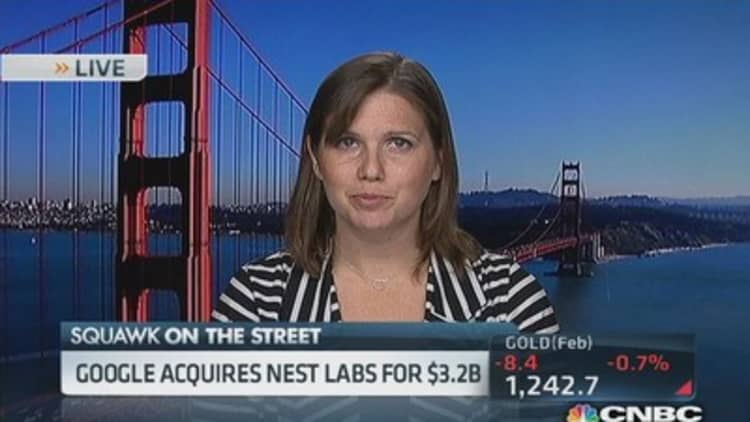As interest builds around innovative "smart home" technology designed to help conserve energy and save money, a new study suggests consumers are slowly hopping on the bandwagon.
A brutal winter has left many feeling the pain of soaring utility bills. Yet a new University of Michigan study suggests households have been slow to adopt cost-saving measures, even as most fret about paying more for home energy than gasoline.
The survey, from the university's Energy Institute, showed that respondents expected their utility bills would rise by 30 percent in the next five years, a far steeper rate than the 15 percent jump they expect to see for gas. But the increase would have to hit about 50 percent for them to make major changes, the survey found.
(Read more: The next battleground for tech companies is...)

"Cost is a foremost energy issue in the minds of most consumers," said the survey's project director, John DeCicco. In an interview with CNBC, he said that some 59 percent of the survey's participants have, to varying degrees, cut back on energy use in response to spiking costs. People with lower incomes were the most likely to adjust their habits, he added.
The findings underscore why there's growing buzz surrounding smart homes, the space where top shelf technology converges with energy efficiency. The industry is considered a major growth area in the wake of Google's $3.2 billion deal for Nest Labs.
(Read more: Unlocking the smart home: Start up pushes smart locks)
The emerging trend, some of which recalls the classic 1960s "Jetsons" cartoon, features all kinds of bells and whistles. More than just LED lightbulbs, the sector has moved to Wi-Fi thermostats, automated washing machines and even "geothermal" heat pumps powered by the sun.
"It puts power in the hand of the user and consumer," said Michael Polentz, co-chair of the real estate and land use group at Manatt, Phelps & Phillips. "It gives them the ability to track [home energy] on a real time basis, and make decisions on how you want to live at any time."
Experts say smart home gadgetry serves the additional purpose of helping consumers monitor their energy use—saving money along the way—while addressing concerns about climate change. The UMich study showed a number of respondents concerned about the impact of energy consumption on air quality.
(Read more: 10 products that make your home smarter)
"It's part of a greater awareness of climate change and using less energy for that reason," said Roy Johnson, CEO of EcoFactor, a smart technology company that provides software to utilities and companies such as Comcast – the parent company of CNBC. He said the trend was jump-started by the ubiquity of high-speed wireless connections, which work seamlessly with smart-home tech.
It lets most consumers monitor and control energy use, helping to lower bills that have spiked in the wake of a brutal winter. At a micro level, it helps reduce carbon emissions cited as the driver behind global warming.
"It's the same reason [households] deploy renewables and solar on their house," Johnson added.
For utilities, home energy savings may also place less strain on power grids during peak demand times and extreme weather. Johnson said some smart technology prototypes include a washing machine that wouldn't activate during peak hours—normally between 3 p.m. and 6 p.m. on weekdays—without a specific override.
Honeywell, which manufactures thermostats that automatically adjust temperatures, and Siemens, which manufactures a "smart grid" that utilizes solar panels to generate electricity, and feeding unused energy back into the utility grid, are just two of the names at the forefront of the smart home push.
The revolution is part of what EcoFactor's Johson calls "a behavioral approach" that uses data to prod the consumer to conserve.
"If you give people more information about their usage patterns, they are more inclined to take action," he said.
--By CNBC's Javier E. David


